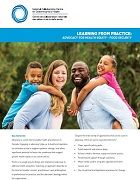Learning from Practice: Advocacy for health equity - Food security
Food insecurity is a growing concern for many households with clear impacts on health and wellbeing. Across Canada, many organizations are taking new approaches to improve food security. This paper highlights the experience of the Ontario Association of Public Health Nutrition Professionals and Food Secure Canada in advocating to improve food security focusing on three advocacy roles in public health (these roles are described in Let’s Talk: Advocacy and health equity).
Role 1 Framing food security as being related to inadequate income and advocating for a move away from charity-based approaches (e.g. food banks) to a focus on income related solutions.
Role 2 Both organizations supported the generation and use of data needed to move forward the policy agendas
Role 3 Working in collaboration and developing alliances with a broad range of partners
Use this resource to:
- Integrate an advocacy approach into your health equity activities
- Develop a health equity framework or strategy for your organization
- Support a conversation in your organization on policy approaches to improving food security
Other resources in the 'Learning from Practice Series':
- Learning from Practice: Advocacy for health equity - Environmental racism
- Learning from Practice: Advocacy for health equity - Generation Squeeze
- Learning from Practice: Advocacy for health equity - Hamilton Public Health Services
Related resources:
Let’s Talk: Advocacy and health equity
Reference:
National Collaborating Centre for Determinants of Health. (2017). Learning from Practice: Advocacy for health equity - Food security. Antigonish, NS: National Collaborating Centre for Determinants of Health, St. Francis Xavier University.
Tags: Food systems, Intersectoral action, Partner with other sectors, Document, Case Study, Learning from Practice
